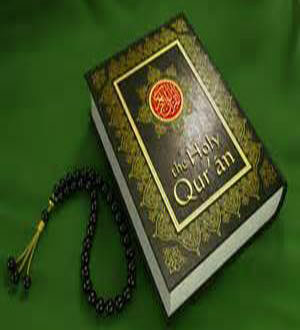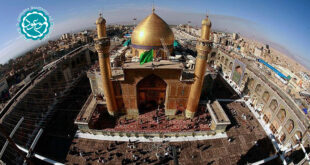“It is He who sent down upon thee the Book wherein are clear verses that are the Mother of the Book and other verses that are ambiguous. Those in whose hearts is doubt and divergence follow the ambiguities in it seeking discord and to interpret them. However, no one knows their interpretation save Allah and those who are steadfast in gaining knowledge. They say we believe in it, all is from our Lord. Yet none remember save those possessed of minds.”2
The meaning of these words
Morphologically, the word muhkam (clear) comes from the root hakama which means an object that nothing can penetrate, take apart, and destroy. Thus, words such as ahkām, tahkīm, hūkm (meaning judgment), hikmah (meaning wisdom), and hikmah (meaning harnessing a horse) all have the meaning of firmness and solidity.
Mutashābih (ambiguous) means things that are similar to each other in some qualities and aspects.
Ta’wīl (interpretation) means the referral and return of one thing to another.
The terms muhkam and mutashābih according to the Qur’an
In some verses the whole Qur’an is identified as muhkam3 and in others mutashābih4. Also, in verse seven of Surat Āl ‘Imrān some of the Qur’an is considered muhkam and the rest mutashābih. This same verse describes muhkam verses as “umm al-kitāb” (Mother of the Book).
It must be noted that the muhkam-ness or solidity of the entire Qur’an existed before the Book was revealed5 and the mutashābih-ness or similarity of the entire Book means that all its verses have a single style—they all possess a pleasant order and solid form, describe truths in a uniform manner, and guide people towards Truth. Thus, here muhkam and mutashābih possess meanings different from what is usual in the whole of the Qur’an.
Considering that the prime meaning of umm is the source, referent, and refuge of objects, the term umm al-kitāb means that the referent (to understand) mutashābih verses are the muhkam ones. In this verse, muhkam and mutashābih are opposites. Then, the verse speaks of people whose hearts have been afflicted with doubt and deviation from Truth and follow mutashābih verses because they seek discord and ‘interpretation’.
This shows that a mutashābih verse is one the meaning and intent of which cannot be understood by just listening to it; rather, there is doubt between various meanings until muhkam verses are referred to and its meaning is made clear. Hence, a mutashābih verse becomes muhkam by muhkam verses however a muhkam verse is muhkam in and of itself.
For instance, in verse five of Sūrat Tā Hā (20:5) it is stated:
“The Rahmān (Beneficent) is established upon the Throne.”
A person who hears this verse will not understand it. However, if, for instance, they refer to verse eleven of Sūrat al-Shawrā’ (42:11), they will realize that the meaning of establishment upon the Throne is that God is predominant over all of existence not that there is a place where He rests which would necessitate that He be material—which is impossible for God:
“There is nothing like Him…”
Another example can be found in Sūrat al-Qiyāmah (75:23):
“Looking towards their Lord.”
And Sūrat al-An‘ām (6:103):
“Eyes do not perceive Him and He perceives the eyes.”
By referring the first verse to the second, we understand that the‘looking’ indicated in the first verse is not physical.
This is also correct for abrogative [nāsikh] and abrogated [mansūkh] verses. When we refer the abrogated verse to the abrogative one we realize that the abrogated verse comprised a precept that was only applicable until the nāsikh was revealed.6
Mutashābih verses indicate a specific intent
A person who carefully studies the whole Qur’an will without doubt not even find one verse lacking signification and explanation.
There is no verse that does not indicate its signification. This signification may either be a single one that a person who is familiar with the discourse will understand or several which may be mistaken with each other. Even so, all these meanings together certainly cover a true and real meaning and intent, otherwise there would be no signification.
This true meaning is not a stranger to the obvious principles of the Qur’an such as existence of the Creator, monotheism, appointment of prophets, canonization of precepts, and so on. It is harmonious with these principles which necessitate and entail that specific meaning. Among all the possible significations, it clarifies a truth. Some verses elucidate others and some verses are the root and source of others.
An attentive person who examines the verse we are discussing (3:7) will have no doubt that muhkamāt are verses that comprise clear and certain Qur’anic principles and mutashābihāt are verses whose meanings are made clear using those principles.
Why are some verses mutashābih?
Some might say: true, subsidiaries must be applied to principles and this is not specific to the Qur’an but this does not necessitate that the Qur’an has mutashābih.
In answer I must say that the reason for mutashābih in the Qur’an is twofold. There are two types of knowledge imparted in the Qur’an:
The first type consists of divine teachings that are beyond the domain of matter and the senses. However, normal intellects halt here and are in doubt as to whether the meaning is physical. For instance, in Sūrat al-Fajr (89:14, 22) it is stated:
“Verily your Lord lies in ambush.”
“And your Lord came…”
These statements are fashioned for a mind that is familiar with tangibles, and the verses seem to signify physical properties. However, when we refer to related principles which repudiate matter and corporeality in such matters, the initial (physical) meaning is removed from the mind.
This pertains to all non-material and transcendent knowledge and it is not specific to the Holy Qur’an. This method is common in other divine books in teachings that have not been altered or distorted and also in theological discussions in philosophy. The Qur’an indicates this where it states:
“He sent down water from the sky that flowed in every channel to the extent of its capacity…”7
“Verily We have made the Qur’an an Arabic book that you may understand and it is with Us in the Mother of the Book, high in dignity and correct in foundation.”8
 Mouood Mouood English Edition
Mouood Mouood English Edition




